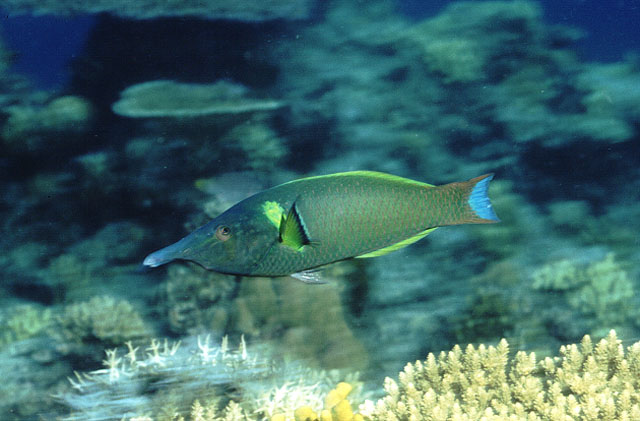
|
Gomphosus varius Lacepède, 1801 Bird wrasse |
||
Bankilan Bird wrasse, Turusyuk, Balaki, Banog, Bunak, Bungat, Danlugan, Isdang bato, Kamumuklit, Labayan, Lampalampa, Lubay-lubay, Mameng, Maming, Maringyan, Molmol, Pilo-pilo, Pirat-pirat, Tamago, Tausay, Verde verde, |
||

|
|
photo by
Cook, D.C. |
| Family: | Labridae (Wrasses) | |||
| Max. size: | 30 cm SL (male/unsexed) | |||
| Environment: | reef-associated; depth range 1 - 35 m | |||
| Distribution: | Indo-Pacific: Cocos-Keeling to the Hawaiian, Marquesas and Tuamoto islands, north to southern Japan, south to Rowley Shoals in the eastern Indian Ocean and Lord Howe and Rapa islands. Replaced by Gomphosus caeruleus in the Indian Ocean (Ref. 37816). Hybrid with Thalassoma lunare documented from Cassini Island, Western Australia and reported from the Great Barrier Reef; with Thalassoma duperrey, observed from Hawaii (Ref. 57557). | |||
| Diagnosis: | Dorsal spines (total): 8-8; Dorsal soft rays (total): 13-13; Anal spines: 3-3; Anal soft rays: 11-11. Identified by long snout when adult and distinguished by color or geography from its sibling G. caeruleus (Ref. 48636). Small juveniles lack the elongate snout (Ref. 37816). | |||
| Biology: | A solitary species (Ref. 90102) found in coral-rich areas of lagoon and seaward reefs to a depth of at least 30 m (Ref. 1602, 58302). Benthopelagic (Ref. 58302). Feeds mainly on small benthic crustaceans, sometimes on small fishes, brittle stars, and mollusks (Ref. 2334). | |||
| IUCN Red List Status: | (Ref. 96402) | |||
| Threat to humans: | harmless | |||
| Country info: | Known from Surigao City (Ref. 58652), Lanuza Bay (Ref. 104756),Tañon Strait (Ref. 107276), Nasugbu, Batangas (Ref. 107854), Calatagan, Batangas (Ref. 107852), Davao Gulf and Sarangani Bay (Ref. 106380), and Bantayan Is. in northern Cebu (Ref. 114734). Also Ref. 1602, 48613, 107853. | |||
| Entered by: Capuli, Estelita Emily - 10.06.92 |
| Modified by: Olisa, Kristine Elaine Paz - 16.05.13 |
| Checked by: Capuli, Estelita Emily - 05.05.95 |